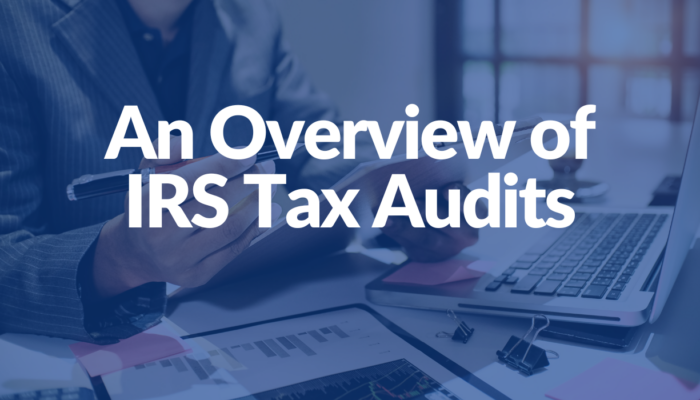The only thing that might be worse than preparing a tax return or writing a check to the IRS is going through a tax audit. That being said, if you’ve just found out that you’re being audited by the IRS, here’s some information to give you a rough idea of what to expect. If you haven’t been audited, you can read about some tips on how to avoid an IRS tax audit.
What is an IRS Tax Audit?
An IRS audit is where the IRS asks to review your financial records to confirm if the information contained on your tax return is accurate and complete. An audit can take place by mail or in person.
Audits by mail are known as “correspondence audits” and are the most common. During a correspondence audit, the IRS sends you a letter asking for more information about certain things on your tax return, like a credit, deduction, or source of income. The IRS will usually ask you to send them copies of documents to support the information or claim on your tax return.
In-person audits don’t happen as often because of how resource-intensive they are for the IRS. Yet you may have an in-person audit if the amount of records the IRS needs to review is too cumbersome to mail. An IRS audit can occur in person at various locations, such as your home or place of business (these are called “field audits”) or at an IRS office (these are called “office audits” or “desk audits”).
How the IRS Chooses Taxpayers to Audit
There are several reasons why the IRS picks a particular taxpayer to audit. The exact reasons and factors the IRS considers aren’t public knowledge, but here are a few potential reasons why your tax return may have been chosen for an audit:
- Random selection: Few, if any, taxpayers get audited purely due to random chance. However, the IRS likely uses a computer to select a group of returns that are potentially at higher risk of containing a mistake or error, and then randomly selects returns to audit from this group.
- Statistical comparison: The IRS will often compare your tax return to the returns of taxpayers who are similar to you in some way. If your return appears to be a statistical outlier, then there’s an increased chance the IRS audits your return.
- Association with another audited taxpayer: If the IRS audits another taxpayer, and you have a financial connection to them, then the IRS may decide to audit you, as well.
How far Back can the IRS Go When Auditing a Tax Return?
It depends. The IRS usually tries to act as quickly as possible once they receive a return they want to audit. This means most audit requests get sent out one to two years after the tax return has been filed. In most cases, the IRS won’t audit a return that’s older than three years.
In relatively rare situations, the IRS will go back even further if they find a large error. Even in these situations, the IRS usually doesn’t audit returns that are more than six years old.
How to Avoid a Tax Audit from the IRS
Keep in mind that you could be subject to an audit even if you’ve done nothing wrong. So, getting audited by the IRS is sometimes inevitable. However, there are things that the IRS looks for when deciding who to audit.
- Wealthier taxpayers: The more money a person makes, the more likely they’ll be audited by the IRS, at least at the higher end of the income spectrum.
- Poorer taxpayers: Taxpayers who report little to no income have a higher chance of getting audited than taxpayers who earn “middle-class” incomes.
- Certain tax deductions: The IRS knows some deductions get abused more than others, such as the home-office and charitable deductions. If a taxpayer claims one of these deductions, there’s a greater chance of an audit. This is especially true if the deduction seems unusual, given the other information reported on the tax return, like reported income.
- Consistent business losses: A business is supposed to exist to turn a profit, so when a business is in the red year after year, the IRS gets suspicious.
- Missing income: If the IRS sees that income on a return doesn’t match the income being reported to them (through a 1099, for example), then there’s a greater chance of an audit.
- Estate tax filings: Tax returns for estates are more likely to get audited because of the higher chance that the taxpayer is undervaluing assets.
Getting Help with an IRS Tax Audit Some audits are fairly simple in that you know exactly why the IRS chose to audit you, and getting them the information to clear things up is easy. But often, the IRS may audit you for reasons you don’t understand and/or ask for information you need help gathering and organizing. If you find yourself in this latter situation, it’s a good idea to talk to a tax professional. And if you think that the audit might reveal information that makes the IRS think you did something illegal, get in touch with a tax attorney before responding to the audit.
All of this can be quite complicated, and the above discussion is only an overview of Form 8938 and the IRS tax reporting requirements for foreign assets and bank accounts. Failing to comply can result in penalties of up to $60,000 and even criminal charges. Therefore, it’s strongly recommended that if you think you might be subject to Form 8938’s reporting and filing requirements, you should consult with a tax professional.
Kienitz Tax Law is here to help you with your tax issues. Schedule your FREE consultation today!

